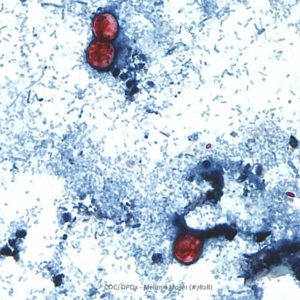Yes. You can sue a grocery store for Cyclospora.
Cyclospora cayetanensis is a parasite that causes an infection of the small intestine called cyclosporiasis. Symptoms include frequent bouts of watery, sometimes explosive, diarrhea; nausea, vomiting, loss of appetite, abdominal cramps, muscle aches, fever and fatigue.
Symptoms can ebb and flow over the course of the infection which can last for weeks or months if untreated. Often the level of fatigue associated with these infections makes it difficult to work.
If you got cyclosporiasis and there is sufficient evidence linking your illness to food you purchased from a grocery store, you have the right to file a lawsuit seeking compensation. Most of the time, this includes money for hospital bills and other medical expenses, lost wages, pain and suffering, and other damages. Contact our Cyclospora food poisoning attorneys online or at 1-888-377-8900.
How Does Cyclospora Get on Food?
Because humans are the only known host for the parasite Cyclospora cayetanensis, transmission occurs when people eat food contaminated with microscopic amounts of feces from an infected person.
This can happen when someone with an infection does not wash hands carefully after using the restroom and then handles food. Or, if feces from an infected person contaminates water that is used to grow or rinse produce.
Cyclosporiasis used to be associated with travel to developing countries in sub-tropical climates, but illnesses linked to imported produce have now become common in the U.S.
Recent Cyclospora outbreaks have been linked to imported produce in salad served at Olive Garden and Red Lobster restaurants, salad served at McDonald’s, Del Monte vegetable trays sold at Kwik Trip gas stations and fresh basil sold at grocery stores and served at restaurants. Our food poisoning lawyers have represented clients in all of these outbreaks and every other major Cyclospora outbreak in the U.S.
Related
McDonald’s Cyclospora Lawsuit Filed by Pritzker Hageman Lawyer
Pritzker Hageman Files Cyclospora Lawsuit Against Del Monte, Kwik Trip
Cyclosporiasis Lawsuit Filed for Woman Who Ate Salad at Cedar Rapids, Iowa Olive Garden
Cyclosporiasis from Grocery Store Food
If you think you have cyclosporiasis, the first thing to do is see a doctor. Tests on your stool sample can determine in you have this infection.
If you test positive, ask your doctor if he or she has notified the health department. You can also contact your health department directly. This is an important step because it provides a record of your illness and helps public health officials identify outbreaks. If you aren’t sure who to call, our food safety lawyers can help you with this.
Public health officials at your city, county or state health department will want to ask you questions about what you ate in the days before you became ill and where you purchased food. They may ask if you have receipts, a shopper card or a notice from the grocery store that shows you purchased a food that was recalled for possible contamination. If you have any remaining servings of the food they suspect is the source of the outbreak, they may want to collect it for testing.
Try to document your illness. Write down the date you became ill, days you experienced symptoms, went to the doctor, missed work etc.
Experienced Cyclospora Lawyers
When you are ready to file a lawsuit, look for lawyers with experience winning lawsuits against grocery stores. Pritzker Hageman’s food poisoning attorneys have a proven track record in these cases. No other law firm has represented more clients in recent large-scale Cyclospora outbreaks. If you have been sickened by Cyclospora, we want to help you, too.
To request a free consultation, call 1 (888) 377-8900 (toll-free), send a text to 612-261-0856 or complete the form below.
